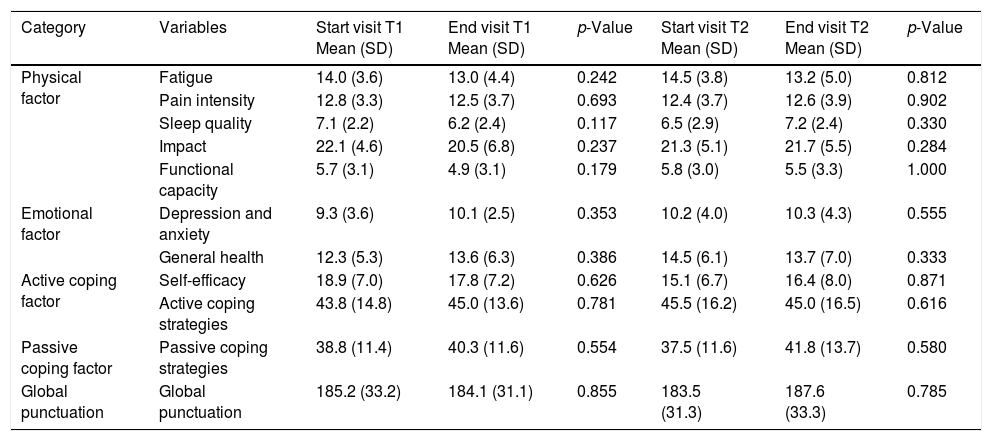Fibromyalgia syndrome (FMS) is a complex chronic disorder that affects nearly 2–4% of the global population, having a negative impact on physical, social, and psychological functioning, and affecting mainly women aged 20–50 years.1,2 Despite the advances in recognition and diagnosis of FMS, its management is still challenging and requires a multidisciplinary intervention strategy aimed at improving symptoms, function and quality of life.
Optimal interventions proposed by recent guidelines include both pharmacological and non-pharmacological approaches. Among non-pharmacological options, nutrition is considered a promising tool, since oxidative stress and/or an imbalance of certain nutritional components are suggested to play a critical role in the development of FMS.3,4 Coenzyme Q10 (CoQ10), magnesium, and tryptophan have proved to be useful in treating fibromyalgia patients. However, the effects of the ingestion of the three components combined have not yet been examined.
We conducted a pilot prospective study (FATMIA Study) investigating the tolerability and effects of a dietary supplementation containing CoQ10, magnesium and tryptophan on reducing fatigue, pain intensity, functional capacity and emotional status in FMS patients. A sample of 23 patients aged from 18 to 80 years underwent two treatment periods of 3 months (active treatment followed by treatment with placebo), with a 1-month washout period in between. To evaluate the most prevalent clinical manifestations of FMS, the self-administered Combined Index of Severity of Fibromyalgia questionnaire (ICAF, an acronym in Spanish for Índice Combinado de Afectación de la Fibromialgia)5 was used.
Twenty patients completed the study, whereas two failed to attend all clinical visits and one presented an adverse event. All participants were female and had an average age of 51.9 (±7.2) years. The mean time since first experiencing fibromyalgia symptoms was 7.7 (±6.3) years. Fifty percent of the group had a paid employment, and none of the patients reported an alcohol intake habit. The vast majority of individuals (85.0%) were not performing any kind of physical activity, and 40.0% of them were smokers (≥1 cigarette per day). Depression and anxiety were reported in 65.0% and 30.0% of cases, respectively. All patients were under pharmacological treatment for FMS symptoms, being paracetamol the most commonly reported medication (60.0%), followed by selective serotonin reuptake inhibitors (45.0%), and tramadol (40.0%).
The nutritional supplement intake for three months led to a partial relapse of physical symptoms, although no statistically significant differences were found among the studied variables (Table 1). Such improvement was somehow expected, since oral supplementation with CoQ10 and magnesium has been previously shown to significantly reduce pain and fatigue in patients with fibromyalgia.6,7 This amelioration, except for the variable fatigue, was not observed after the 3-month placebo treatment. Score values regarding depressive symptoms, however, showed that emotional status of patients did not enhance after study treatment, despite the use of more active coping strategies, and the fact that all three components of the nutritional supplement individually have demonstrated to control and/or prevent depression in fibromyalgia.8–10 Nonetheless, there was a global improvement of patients’ symptoms after the study treatment, and a global decline after placebo treatment (p>0.05).
ICAF punctuation of emotional, physical, and coping aspects reported by patients, and global ICAF score across visits.
| Category | Variables | Start visit T1 Mean (SD) | End visit T1 Mean (SD) | p-Value | Start visit T2 Mean (SD) | End visit T2 Mean (SD) | p-Value |
|---|---|---|---|---|---|---|---|
| Physical factor | Fatigue | 14.0 (3.6) | 13.0 (4.4) | 0.242 | 14.5 (3.8) | 13.2 (5.0) | 0.812 |
| Pain intensity | 12.8 (3.3) | 12.5 (3.7) | 0.693 | 12.4 (3.7) | 12.6 (3.9) | 0.902 | |
| Sleep quality | 7.1 (2.2) | 6.2 (2.4) | 0.117 | 6.5 (2.9) | 7.2 (2.4) | 0.330 | |
| Impact | 22.1 (4.6) | 20.5 (6.8) | 0.237 | 21.3 (5.1) | 21.7 (5.5) | 0.284 | |
| Functional capacity | 5.7 (3.1) | 4.9 (3.1) | 0.179 | 5.8 (3.0) | 5.5 (3.3) | 1.000 | |
| Emotional factor | Depression and anxiety | 9.3 (3.6) | 10.1 (2.5) | 0.353 | 10.2 (4.0) | 10.3 (4.3) | 0.555 |
| General health | 12.3 (5.3) | 13.6 (6.3) | 0.386 | 14.5 (6.1) | 13.7 (7.0) | 0.333 | |
| Active coping factor | Self-efficacy | 18.9 (7.0) | 17.8 (7.2) | 0.626 | 15.1 (6.7) | 16.4 (8.0) | 0.871 |
| Active coping strategies | 43.8 (14.8) | 45.0 (13.6) | 0.781 | 45.5 (16.2) | 45.0 (16.5) | 0.616 | |
| Passive coping factor | Passive coping strategies | 38.8 (11.4) | 40.3 (11.6) | 0.554 | 37.5 (11.6) | 41.8 (13.7) | 0.580 |
| Global punctuation | Global punctuation | 185.2 (33.2) | 184.1 (31.1) | 0.855 | 183.5 (31.3) | 187.6 (33.3) | 0.785 |
T1: treatment with nutritional supplement containing coenzyme Q10, magnesium and tryptophan; T2: treatment with placebo.
To conclude, the results of this pilot study suggest that supplementation with CoQ10, tryptophan, and magnesium for three months in patients with fibromyalgia may be well tolerated and could improve physical symptoms such as fatigue, sleep quality and functional capacity, as well as the global well-being of patients. Nevertheless, larger studies are needed to confirm these findings and whether the observed improvements could be statistically significant. Forthcoming investigations should also contemplate the effect of dietary habits and pharmacologic basal treatment for FMS on the efficacy of this nutritional supplementation.
FundingThis work was supported by Advanced Sport & Nutritions Lab (AS&NL).
Conflict of interestThe authors have no conflict of interest to declare.
The authors thank Blanca Martínez-Garriga who provided medical writing assistance on behalf of Trialance (www.trialance.com).







